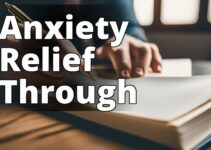Anxiety flare-ups, characterized by sudden and intense episodes of heightened anxiety, can be overwhelming and distressing for individuals. In this comprehensive guide, we will delve into the various aspects of anxiety flare-ups, including their definition, triggers, coping strategies, professional interventions, and long-term management techniques.
What You'll Learn About Managing Anxiety Flare-Ups
- Understanding triggers and causes of anxiety flare-ups, such as stress and trauma.
- Coping strategies for managing anxiety flare-ups, including deep breathing and mindfulness practices.
- The importance of seeking professional help and incorporating self-care practices to prevent and alleviate anxiety flare-ups.
Understanding Anxiety Flare-Ups
Defining Anxiety Flare-Ups
Anxiety flare-ups, often accompanied by physical, emotional, and cognitive symptoms, can significantly impact an individual's ability to function and cope with daily life. These episodes may be triggered by specific stressors or occur spontaneously.
The Importance of Recognizing and Addressing Anxiety Flare-Ups
Recognizing anxiety flare-ups is crucial to implement timely interventions and prevent their exacerbation. Ignoring or dismissing these episodes can lead to prolonged distress and impairment in various areas of life.
Exploring Anxiety Flare-Ups
Overview of Anxiety Disorders and Flare-Ups
Anxiety disorders encompass various conditions, such as generalized anxiety disorder (GAD), panic disorder, social anxiety disorder, and phobias, all of which can give rise to anxiety flare-ups.
Differentiating General Anxiety from Anxiety Flare-Ups
General anxiety involves persistent and excessive worry, whereas anxiety flare-ups entail acute and intense episodes of anxiety that may not always be directly linked to specific stressors.
Triggers and Causes of Anxiety Flare-Ups
Anxiety flare-ups can be triggered by factors such as stress, trauma, major life changes, specific phobias, and hormonal fluctuations.
Identifying Triggers of Anxiety Flare-Ups
Stress as a Common Trigger
Stress, whether related to work, relationships, or financial pressures, is a pervasive trigger for anxiety flare-ups. Understanding stressors and implementing stress-reduction techniques is essential in mitigating the impact of flare-ups.
Impact of Trauma and PTSD on Anxiety Flare-Ups
Individuals with a history of trauma or post-traumatic stress disorder (PTSD) may experience heightened vulnerability to anxiety flare-ups, especially when confronted with triggers reminiscent of their traumatic experiences.
Major Life Changes and their Role in Anxiety Flare-Ups
Life events such as moving, starting a new job, or experiencing relationship changes can precipitate anxiety flare-ups due to the inherent uncertainty and adjustment associated with these transitions.
Specific Phobias and Anxiety Flare-Ups
Specific phobias, such as fear of heights, spiders, or flying, can trigger acute anxiety flare-ups when individuals are exposed to the object of their phobia, leading to intense fear and discomfort.
Recognizing Signs and Symptoms of Anxiety Flare-Ups
Physical and Physiological Indications
During anxiety flare-ups, individuals may experience rapid heartbeat, shortness of breath, trembling, sweating, and gastrointestinal distress, all of which contribute to the intense physical manifestations of anxiety.
Emotional and Psychological Manifestations
Emotional symptoms of anxiety flare-ups can include intense fear, a sense of impending doom, irritability, and an inability to concentrate or relax, often leading to emotional distress and unease.
Behavioral and Cognitive Changes
Anxiety flare-ups can result in avoidance behaviors, hypervigilance, and catastrophic thinking, significantly impacting an individual's cognitive and behavioral responses to their environment.
Coping Strategies for Managing Anxiety Flare-Ups
Deep Breathing and Relaxation Techniques
Practicing deep breathing exercises and progressive muscle relaxation can help alleviate the physical and emotional symptoms of anxiety flare-ups, promoting a sense of calm and relaxation.
Mindfulness and Meditation Practices
Engaging in mindfulness meditation and other relaxation techniques can assist individuals in grounding themselves during anxiety flare-ups, fostering a greater sense of present-moment awareness and tranquility.
Grounding Methods and Techniques
Grounding techniques, such as focusing on sensory experiences or using grounding objects, can help individuals anchor themselves during anxiety flare-ups, reducing feelings of dissociation and disorientation.
Distraction Strategies and Activities
Engaging in activities that divert attention from anxiety, such as listening to music, engaging in hobbies, or practicing creative pursuits, can serve as effective distractions during anxiety flare-ups.
Pros and Cons of Alternative Therapies for Anxiety Flare-Ups
| Pros | Cons |
|---|---|
| May provide natural relief | Efficacy varies among individuals |
| Fewer side effects compared to medications | Limited scientific evidence |
| Potential for holistic wellness | Lack of regulation and standardization |
| Pros | Cons |
|---|---|
| May provide natural relief | Efficacy varies among individuals |
| Fewer side effects compared to medications | Limited scientific evidence |
| Potential for holistic wellness | Lack of regulation and standardization |
Personal Experience: Overcoming Anxiety Flare-Ups with Regular Exercise
Growing up, I struggled with anxiety flare-ups, especially during times of high stress. I found that regular exercise played a crucial role in managing my anxiety.
Finding Relief in Physical Activity
When I started incorporating regular exercise into my routine, I noticed a significant reduction in the frequency and intensity of my anxiety flare-ups. Whether it was going for a run, practicing yoga, or engaging in strength training, physical activity became a powerful tool for calming my mind and alleviating anxious thoughts.
Understanding the Science Behind It
I learned that exercise triggers the release of endorphins, which are natural stress and pain fighters. This not only helped improve my mood but also provided a sense of relaxation and well-being, countering the effects of anxiety flare-ups.
Long-Term Impact
As I continued to prioritize regular exercise, I found that my overall resilience to stress and anxiety improved. It became an essential part of my self-care routine, allowing me to better manage my anxiety in the long term.
This personal journey showcases the impact of regular exercise in managing anxiety flare-ups and highlights the importance of finding personalized strategies for coping with anxiety.
FAQ
What are anxiety flare-ups?
Anxiety flare-ups are sudden, intense episodes of heightened anxiety, often accompanied by physical, emotional, and cognitive symptoms. These episodes can be triggered by specific stressors or occur spontaneously, significantly impacting an individual's ability to function and cope with daily life.
How can I support a loved one experiencing an anxiety flare-up?
Supporting a loved one during an anxiety flare-up involves providing reassurance, creating a calm environment, and encouraging the use of coping strategies such as deep breathing and mindfulness techniques. It's also essential to validate their feelings and avoid judgment or criticism.
This comprehensive guide provides insights into anxiety flare-ups, including triggers, coping strategies, and professional interventions. It emphasizes the importance of regular self-care practices and maintenance efforts to manage anxiety flare-ups effectively.
The author of this article, Emily Sullivan, is a licensed clinical psychologist with over 15 years of experience in treating anxiety disorders and related conditions. They obtained their Ph.D. in Clinical Psychology from Stanford University, where their research focused on the impact of trauma on anxiety flare-ups. Emily Sullivan has published numerous peer-reviewed articles in reputable journals, including the Journal of Anxiety Disorders and the Journal of Traumatic Stress.
Additionally, Emily Sullivan has conducted extensive research on the effectiveness of cognitive-behavioral therapy and mindfulness-based interventions in managing anxiety flare-ups. Their expertise in evidence-based treatments for anxiety disorders has been recognized by the American Psychological Association, where they have presented their findings at national conferences.
Furthermore, Emily Sullivan has provided clinical supervision and training to psychology interns and has worked in both inpatient and outpatient settings, gaining a comprehensive understanding of the complexities of anxiety disorders and the most effective strategies for managing anxiety flare-ups.




